Eating a nutritious diet
Eating a nutritious diet is essential during cancer.
Research has shown that weight loss caused by cancer and cancer treatment can reduce your response to treatment, increase treatment-related side effects, and reduce overall survival. Unintentional weight loss is stressful and can affect your overall quality of life.
A healthy diet includes a variety of foods, including carbohydrates, protein, fats, vitamins, and minerals. A diet rich in energy and protein helps you maintain a healthy weight during cancer. Side effects caused by the disease or its treatments can often make eating and maintaining a healthy weight difficult for people with cancer.
It is important to remember that keeping well-nourished is vital for recovery, can help you feel better, and your body stays strong and yields many physical and mental benefits.
Diet and cancer
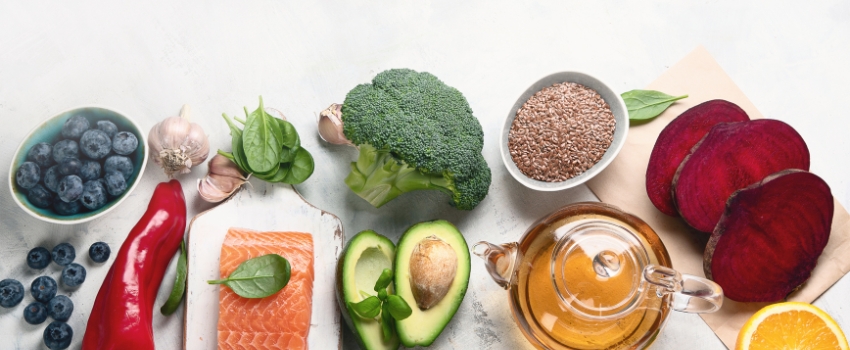
There is no scientific evidence that following any diet can cure cancer or replace cancer treatment (1). In recent years there has been a lot of interest in diet and cancer. Complementary or alternative fad diets are often restrictive and make false claims about curing or treating cancer.
It is not advised to exclude whole food groups, such as dairy or carbohydrates, from your diet during cancer treatment. Exchanging food groups or multi foods can increase your risk of nutritional deficiencies. It may also affect your ability to maintain weight during cancer treatment. This may harm your treatment plan.
We recommend you maintain a stable weight during cancer treatment, even if you are overweight (2). This is because weight loss during cancer treatment can affect your body’s ability to cope with the treatment and the possible side effects (3).
After cancer treatment, it is helpful to maintain a healthy body weight to reduce your risk of cancer recurrence, diabetes, and heart disease. If you are considering following a particular diet, discuss it with your doctor or a dietitian.
A dietitian is a registered healthcare professional that can assess, diagnose and treat dietary and nutritional problems at an individual and wider public-health level. Dietitians are the only nutrition professionals to be regulated by law and are governed by an ethical code to ensure that they always work to the highest standard.
A dietitian will ensure that your diet meets your needs during your cancer journey. If you are not eating well or experiencing a reduced appetite, please ask your doctor to refer you to a dietitian.
Important diet considerations during cancer treatment
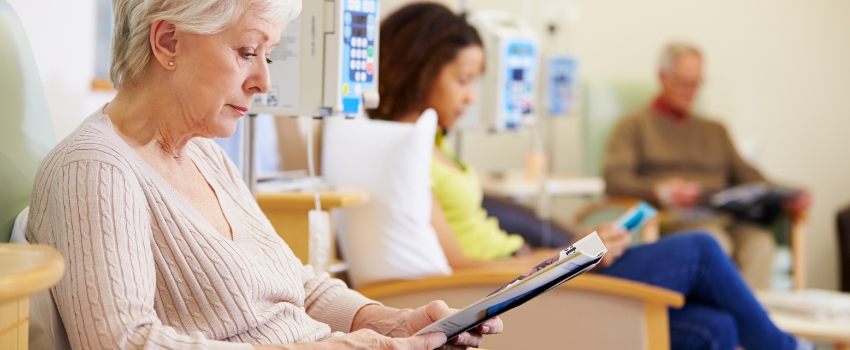
Cancer or its treatments can significantly alter how your body uses the food you eat. Often your energy needs increase, and your food intake decreases due to a poor appetite or other symptoms. This results in weight loss. Even if you are eating a normal amount of food, your body might not properly use the nutrients or burn energy faster than usual.
No matter what the cause, it is essential that unintentional, rapid weight loss is addressed, as it hurts recovery. The most important thing you can do during cancer and weight loss is to eat little and often, snack frequently, and introduce calories wherever possible.
You can find evidence-based information, resources and recipes to support people with cancer who are in active treatment or post treatment here
How treatment can impact your diet
Cancer and cancer treatments have different effects on everybody. The side effects can vary from person to person, and not everybody will experience them.
Chemotherapy can result in many side effects. Radiation therapy usually affects the area being treated, e.g. receiving treatment to the head and neck may result in difficulty eating and swallowing. Surgery to remove a tumour can result in problems eating and digesting a regular diet.
- POOR APPETITE
A change in appetite is very common during cancer treatment. Your favourite foods may no longer appeal to you, you may have a reduced appetite, or you may not want to eat at all. Without forcing yourself to eat, it is important to try to eat small amounts regularly to avoid weight loss.
- Eat whenever you feel hungry. If you are hungriest in the morning, then eat your biggest meal at that time.
- Eat little and often. Try to eat something every 2-3 hours and avoid long gaps between eating.
- Avoid large platefuls of food at mealtimes if you find it puts you off eating. Remember, the key is small amounts of food at regular intervals. Aim for three small meals, as well as two to three snacks, every day. Make these snacks high in calories and protein.
- Aim to have 1 pint of full-fat milk per day, or even better, make fortified milk.
- Drink at least 6 cups of fluids each day. However, be careful not to fill up on drinks such as tea, coffee, Bovril or packet soups that don’t contain much nourishment between meals. Avoid drinking just before a meal if you find it fills you up.
- Limit fibre as it fills you up quickly.
- Avoid low calorie, ‘light’, low-fat, reduced-fat, reduced-sugar and ‘diet’ foods.
- Have a dessert every day. Suitable desserts are milk puddings, full-fat yoghurts, sponge cake with custard, trifle, jelly and ice cream, stewed fruit with custard and fruit tart with custard.
- Aim to have 2-3 portions of high-protein foods each day. Foods high in protein are meat, chicken, fish, eggs, milk, cheese, nuts and pulse vegetables such as peas, beans and lentils.
- A short walk or spending some time outdoors before a meal can help increase your appetite.
- Make the most of your appetite when you feel hungry. Some people find that they feel hungrier earlier in the day, while other people find that their appetite improves towards the evening or during the night.
- A small glass of wine, beer or sherry before a meal may boost your appetite – if your doctor allows it.
- TIREDNESS
Fighting cancer and undergoing cancer treatments can often drain your energy and leave you feeling tired and fatigued. It can be due to a variety of reasons. Persistent fatigue can lead to weight loss quite quickly as you might not have enough energy to shop, prepare or even eat food.
- Get a friend or family member to do your shopping. Many larger shops deliver groceries directly to your house when you order online.
- Prepare your meals when you have energy and refrigerate or freeze them.
- Get help cooking meals.
- When too tired to cook, consume nourishing, high-calorie drinks such as milk, smoothies, juices, milkshakes or prescribed nutritional supplements.
- Eat foods that require little preparation and snack frequently.
- Light exercise may help reduce fatigue and increase appetite.
- Talk to a family member, a carer or a healthcare professional if a problem makes eating difficult for you. For example, pain in your hands or fingers may make using cutlery difficult, or a problem with your teeth or dentures may be preventing you from chewing or swallowing food.
- NAUSEA AND VOMITING
Nausea is when you feel sick, have an unpleasant feeling in your stomach or throat, feel dizzy, clammy and don’t want to eat. Vomiting is being sick or throwing up. The most common cause of these symptoms is chemotherapy. You should discuss these symptoms with your doctor, as anti-sickness medications can ease nausea and prevent you from throwing up. If you are frequently vomiting, seek medical advice and stay hydrated with clear fluids or nourishing fluids like milk and sports drinks.
- Eat little and often. Avoid skipping meals as this can lead to hunger which worsens nausea.
- Bland, cold foods have less taste and smell and will be better tolerated.
- Avoid greasy, spicy and sugary foods or those with strong odours.
- Drink ginger ale or include ginger in meals as ginger helps to soothe nausea.
- Avoid your favourite foods when nauseated, as you may grow to dislike them.
- Avoid eating 1-2 hours before treatment as this may help to lessen nausea.
- Try not to prepare meals when nauseated and rest after meals.
- DIARRHOEA
Various cancer treatments can cause diarrhoea by irritating the lining of your digestive system. Medications and drugs may also cause diarrhoea, so discuss these with your doctor. The tumour itself can also stimulate diarrhoea in certain gut cancers. The most important thing to do is to remain hydrated and to replace the body’s lost salts, called electrolytes.
- Constantly sip fluids such as sports drinks or carbonated beverages.
- Eat little and often.
- Limit high-fibre foods like beans, whole grains and raw fruits and vegetables, as they may worsen diarrhoea.
- Probiotics may help alleviate symptoms but can interfere with chemotherapy, so consult your doctor first.
- Avoid greasy or fatty foods and foods containing citrus, sweeteners or caffeine. Also, avoid prune, apple or pear juice as they worsen diarrhoea symptoms.
- Eat foods which are easy to digest, such as bananas, oatmeal and white pasta.
- Dairy products can sometimes aggravate symptoms due to lactose sugars in milk.
- CONSTIPATION
Chemotherapy may interfere with the nerve supply to the bowel and can cause constipation. Certain drugs and painkillers can make this worse. Surgery to the stomach or bowel may result in constipation due to problems pushing stool out. Tumours in the abdomen or bowel may make it difficult to have a bowel movement. Constipation is also caused by a lack of fibre, not enough exercise and not drinking enough water.
- To help your bowels move more often, you need to gradually increase fibre in your diet and it is important to gradually increase the amount of fluids you consume also.
- Certain drinks stimulate a bowel motion. These include prune juice, pineapple juice and hot drinks in the morning.
- Some high-fibre foods such as fruit, vegetables, and salads can be low in calories and protein and fill you up quickly. Choose instead foods that contain both fibre and calories, such as prunes, nuts, dried fruit, stewed fruit with added sugar; porridge/wholegrain cereals with full-fat/fortified milk; whole grain bread with full-fat butter or hummus; creamy chicken and vegetable soup.
- If constipation makes you bloated, avoid foods like beans, broccoli, cauliflower and carbonated drinks.
- Gentle exercise can help prevent and treat constipation.
- If constipation remains a problem, you can gradually include linseed/flaxseed in your diet. Start with one teaspoon per day and gradually increase by one teaspoon per day, every two days, to a maximum of six teaspoons per day. You must include an extra cup of fluid for every 2-3 teaspoons of linseed or flaxseed you eat.
- If you have tried all the above approaches and are still not having regular bowel movements, ask a healthcare professional for further advice. You may have an undiagnosed condition or be experiencing a medication-related side effect and/or require laxatives.
- INDIGESTION AND REFLUX
Some chemotherapy or biological therapy drugs used to treat cancer can cause indigestion.
- Avoid large meals. Eat small, frequent meals instead.
- Herbal teas and peppermint tea may help to soothe indigestion.
- Avoid eating foods that are fatty, spicy, vinegar-based or citrus foods, as well as carbonated drinks, caffeine and alcohol.
- Often, indigestion and reflux are worse when you are lying down. Avoid eating 2-3 hours before bed, and don’t lie down after eating a meal. Raising the head of your bed can also help.
- Speak to your doctor about medications or other treatments which can help.
- SORE MOUTH
Some anti-cancer drugs may result in sores forming in the mouth or cause mouth pain. Treatments to the head and neck often result in a sore mouth, making eating and swallowing quite difficult.
- Eat soft foods like puddings and yoghurts. Moisten foods with gravy or sauces to make them easier to eat.
- Purée foods to make them easier to eat and swallow.
- Avoid rough-textured foods like toast and overly tart, salty or vinegar-based foods.
- Sip fluids throughout the day.
- Cold foods such as ice cream can help soothe a sore mouth.
- DRY MOUTH
Chemotherapy and radiation therapy can damage salivary glands, reducing the amount of saliva in your mouth. This results in a dry mouth. This makes it a lot more challenging to eat and enjoy food.
- Sip fluids throughout the day to moisten your mouth.
- Maintain good dental health and oral hygiene. Milk helps protect teeth.
- Soft, moist, puréed foods are easier to eat. Add sauces to moisten foods.
- Rinsing your mouth with water and baking soda can help stimulate saliva.
- Avoid salty foods and spicy food, caffeine and alcohol, which dry out your mouth further.
- It is best to avoid foods that stick to the roof of your mouth, e.g. fresh bread and pastry.
- Chewing gum or sucking hard-boiled sweets may help to stimulate saliva.
- DIFFICULTY SWALLOWING
Foods and thin liquids may cause coughing, choking, or it may feel as though there is food caught in your throat. This can be caused by the cancer itself or by head and neck radiotherapy. Many people with difficulty swallowing lose a lot of weight – therefore, it is essential to maintain adequate nutrition.
- Moisten foods with sauces.
- Thickening thin liquids can make them easier to swallow. This can be done with corn starch or a prescribed thickener.
- Finely chop meat and vegetables to make them easier to chew and swallow.
- Eat little and often and consume plenty of high-calorie drinks if you cannot eat.
- Purée foods to make them easier to swallow.
- TASTE AND SMELL CHANGES
Cancer and cancer treatments can significantly affect your taste and smell. Foods that once appealed to you may no longer be desired. Your sensitivity to odours may increase, and your taste may decrease, or often patients say they have a metallic taste in their mouth. Foods may seem bitter, bland or salty.
- Try new foods and eat whatever appeals to you. You may suddenly like foods that you once disliked.
- Rinse your mouth with a solution of water and baking powder before and after eating to help normalise taste.
- Cold or lukewarm foods have a weaker taste and smell and may be more tolerable.
- If food tastes too bland, add herbs, seasoning, spices, garlic or onions to boost flavour. Fat is a great flavour carrier so add fats to meals freely.
- If there is a metallic taste in your mouth, rinse your mouth regularly and try eating with plastic utensils instead of metal ones.
- Marinating meats can help to mask any metallic tastes.
Tips for Enriching your Food
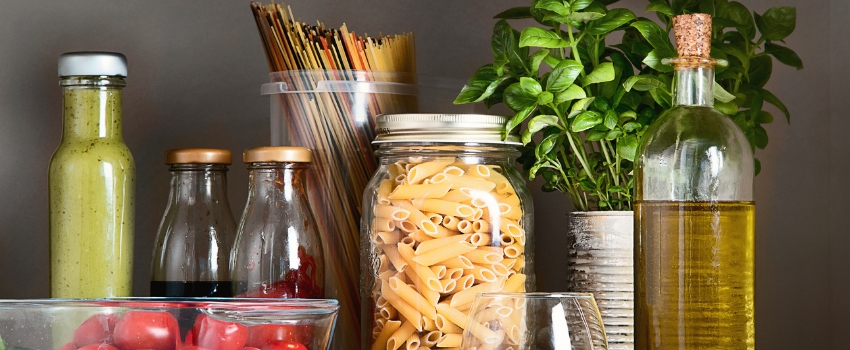
You can increase the protein and calorie content of your food by adding any of the foods below to your meals and snacks.
SKIMMED MILK POWDER
Skimmed milk can be found in most of the main supermarkets in the tea/coffee aisle. It has a long shelf-life and can be kept in a cupboard for six weeks once opened. Skimmed milk powder is made by removing water and the majority of the fat content of milk. It is an excellent source of protein and provides a full range of amino acids. Some brands are also fortified with essential vitamins, such as vitamin D. It is used to boost the protein content of meals and drinks that are low in protein.
Make up a pint of fortified milk every morning and store it in the fridge. Use this jug of nourishing milk throughout the day in your drinks, cereal or porridge. It can also be added to soups and milk puddings.
DAIRY FOODS
Skimmed milk powder: Around 15g (2 level tablespoons) can be added to milky drinks such as hot chocolate or Ovaltine, milk puddings, smoothies and milk-based sauces.
Full-fat cheese: Add to meals and snacks to increase their nutritional value, e.g. cheddar, edam, parmesan, and cream cheese.
NUTS AND SEEDS (Source of Fibre)
Nuts (25-30g): Chop and add to breakfast cereals, granola or smoothies. Nuts can also be used in baking (e.g. added to cakes, breads or muffins) or can be finely chopped and mixed with breadcrumbs for a crunchy coating on chicken and fish.
Seeds (1-2 teaspoons): Whole or milled seeds can be added to breads/ scones, smoothies or sprinkled over cereals. Seeds are a good source of Omega-3 and are high-fibre foods, e.g. chia, flaxseed, linseed, sunflower, and pumpkin seeds.
SUGAR, JAM, HONEY, MAPLE SYRUP
These can be used to sweeten breakfast cereals and smoothies, drizzled on pancakes or added to baking and desserts (2-3 teaspoons per portion, depending on taste).
FATS, OILS, SPREADS AND SAUCES
Oils: Rapeseed oil can be used to fry or roast foods. Olive oil can be drizzled over foods such as bread or salads if desired.
Double Cream: Around 50mls per portion can be added to many hot and cold dishes, e.g. soups, desserts, risottos, curry, stews or casseroles.
Spreads: Butter, full-fat spreads, mayonnaise or pesto can be added to many foods and snacks, e.g. sandwiches, mashed potatoes and salads.
Sauces: Cream-based sauces, white sauces, cheese sauce or gravy can be added to pasta, vegetables or meat and fish to increase the energy and protein content.
1 teaspoon (tsp.) = 5g
1 tablespoon (tbsp.) = 15g
Stocking up Your Store Cupboard
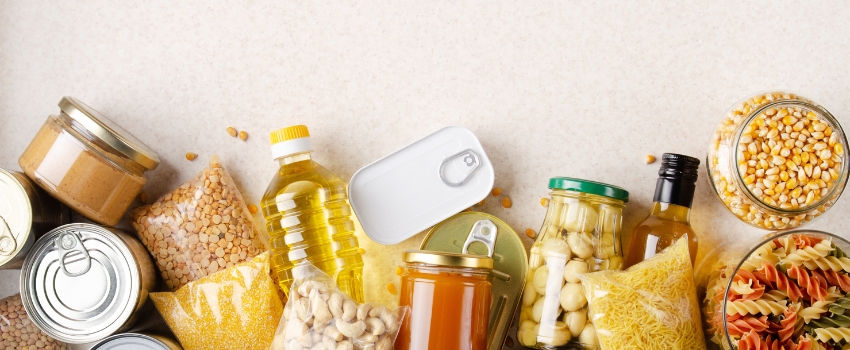
Tinned, dried and frozen foods are time-saving nutritious essentials that you can stock up on and store until needed. A selection of herbs and spices is particularly important for flavouring your food without adding salt, and having a variety of tinned beans in the cupboard will allow you to whip up protein-rich meat-less meals. We have compiled a list of food below, the majority of which are non-perishable, which will help you to create a well-rounded food pantry.
Although your first ‘stock-up’ shop may be expensive, you will then have the ingredients on hand for when you need them. The ingredients can be mixed and matched or else paired with frozen foods or a few key fresh ingredients to make a variety of delicious, healthy meals.
TINS
- Chickpeas
- Sweetcorn
- Light coconut milk
- Tinned pineapple (in natural juice)
- Tinned tomatoes (chopped tomatoes, plum tomatoes, passata)
- Tinned beans (kidney beans, mixed beans, butter beans)
- Baked beans (opt for reduced sugar and salt varieties)
- Tinned fish: tuna, salmon, mackerel, sardines (opt for varieties in spring water or tomato sauce)
PULSES AND GRAINS
- Rice
- Pasta
- Noodles
- Quinoa
- Lentils
HERBS AND SPICES
- Cumin (ground, seeds)
- Coriander (ground, seeds)
- Smoked paprika
- Chilli (powder, flakes)
- Cardamom seeds
- Turmeric
- Cayenne
- Fennel seeds
- Mustard seeds
CONDIMENTS, SAUCES AND JARS
- Stock cubes
- Tomato purée
- Mayonnaise
- Black pepper
- Olives
- Soy sauce
- Vanilla extract
- Honey
- Nut butter
- Horseradish sauce
OTHER
- Nuts & Seeds
- Dried fruit
- Oats
- Flour (brown, white & corn)
KEY FRESH PRODUCTS
- Lean meats
- Fish
- Eggs
- Fresh herbs
- Milk
- Vegetables of choice
- Fruits of choice
- Natural yoghurt
- Crème fraîche
- Cheese
Alternative cancer diets
It is not recommended to follow any restrictive diet if you have been diagnosed with cancer or while undergoing treatment.
Ketogenic Diet
Should I follow a Ketogenic diet?
No, neither the National Cancer Control Programme (NCCP) here in Ireland nor any other major cancer organisation recommends the ketogenic diet for cancer patients. It is also not advised for cancer prevention.
For more information, go to our Ketogenic Cancer Diet page
What is the Alkaline Diet?
The acidity or alkalinity of your blood is measured using the pH scale, and this is tightly regulated by your kidneys. A pH of 0 is completely acidic, a pH of 14 is completely alkaline, and a pH of 7 is neutral. Different parts of our bodies have different pHs in order to carry out their various roles effectively. Blood is naturally slightly alkaline (pH around 7.4) whereas your stomach is very acidic (pH around 3.5) so it can help break down food. It is not possible to alter blood pH through the food that you eat.
What is the theory behind the alkaline diet in cancer?
The theory behind this diet is that an acidic body environment promotes diseases like cancer and an alkaline environment contributes to good health. This diet has become very popular in the media but any studies that reported these results were done in a laboratory setting, and do not directly translate to the human body (7).
Should I follow an Alkaline Diet?
There is no evidence to show that following an alkaline diet reduces cancer risk or protects against cancer. Following an alkaline diet (where meat and dairy is often avoided) will not change the pH of your blood or any other organ. Following this type of restrictive diet may contribute to weight loss and result in inadequate intakes of many nutrients including calcium, Vitamin D, Vitamin B12 and protein, and could have a negative impact on your condition and treatment. Even if diet could change blood pH, it is important to note that an alkaline environment may interfere with the efficacy of chemotherapy treatments (8).
Gerson Therapy and Cancer
Gerson therapy is not an effective way to treat cancer, and it is not recommended by any national or international cancer organisation.
This diet is plant-based and involves consuming ‘super doses’ of organic juices alongside taking supplements, pancreatic enzymes, and other vitamin and mineral supplements (9). This treatment also recommends coffee enemas multiple times per day.
Following a Gerson diet also involves restricting your animal fat intake (dairy products) and protein. These food groups play an important role in helping to keep your weight stable and helping to maintain your muscles. If you have been diagnosed with cancer, it is not recommended to exclude these food groups (10).
The aim of this diet is to boost the immune system and cleanse toxins from the body. Removing toxins is the natural job of the kidneys and the liver, and it is not recommended to follow a detox diet if you have been diagnosed with cancer. High-doses of vitamin and mineral supplements can negatively impact anti-cancer treatments such as chemotherapy and make it less effective (11).
Some aspects such as eating lots of fruits and vegetables can be beneficial and are known to positively influence cancer risk, but only when consumed as part of a healthy balanced diet and not taken to extremes e.g. following a juice-based diet can deprive you of other important food groups such as protein. This can be particularly harmful to people who have lost weight or are at risk of losing weight.
Most Gerson Therapists encourage people to stop chemotherapy while following a Gerson diet. Choosing to stop or delay the conventional treatments recommended by your doctor can greatly reduce overall survival and can be harmful to your health.
Intermittent fasting
This type of diet involves fasting or eating very little for prolonged periods of time. If you have been diagnosed with cancer, this type of diet is not recommended. Fasting can reduce your ability to consume all the important nutrients needed. If you are undergoing cancer treatment, your body needs plenty of energy, protein, vitamins, and minerals to help it cope (41)
Fasting also places you at an even greater risk of losing weight. We know it is important to maintain your weight during cancer treatment, even if you are overweight (42). The research into intermittent fasting is in an early phase and has mainly been conducted in animal and cell studies (43). Hence, there is limited evidence to support intermittent fasting (44). Fasting is not recommended for patients who are at risk of malnutrition or those who have diabetes.
Should I start juicing or try detox diets?
No, there is no evidence that juicing or a detox diet prevents or treats cancer.
Juicing removes the juice from fruits and vegetables using a juicer or blender. It was previously thought that consuming only fresh juice for a prolonged period would eliminate toxins in the body that might cause cancer. Research shows that detoxes are not necessary or healthy to do (48). Our liver and kidneys play a key role in removing unwanted toxins from our bodies.
Fruits and vegetables contain many important nutrients that have been shown to reduce cancer risk but to get the full benefit, it is better to eat them whole. Juicing removes the important nutrient fibre. Fibre has been linked to lower rates of bowel cancer (49).
Following a juicing or detox diet may cause more harm than good (50). These diets usually involve severe calorie (energy) restriction and cause weight loss. This may impact your own ability to cope with treatment. It is hard to meet your nutritional requirements while following a juicing diet, and it is likely that you will miss out on essential food groups such as protein. However, if your diet is low in fruit and vegetables or you are having difficulty chewing or swallowing food during your treatment, juicing can be an option to add valuable nutrients to your diet. Your dietitian will discuss this with you. Following a juicing or detox diet is not recommended if you have been diagnosed with cancer or while undergoing treatment.
Coffee enemas
Despite the growing popularity of colon cleansing using coffee enemas, there is no evidence to support claims that it can help to treat cancer and may actually cause more harm than good (51).
Enemas involve injecting large amounts of fluid into the rectum. Coffee enemas can cause gastrointestinal distress, such as nausea, vomiting, and diarrhea. Other side effects include dizziness, dehydration, electrolyte abnormalities, acute kidney insufficiency, bowel perforation, and an increased infection risk (51,52).
Meat
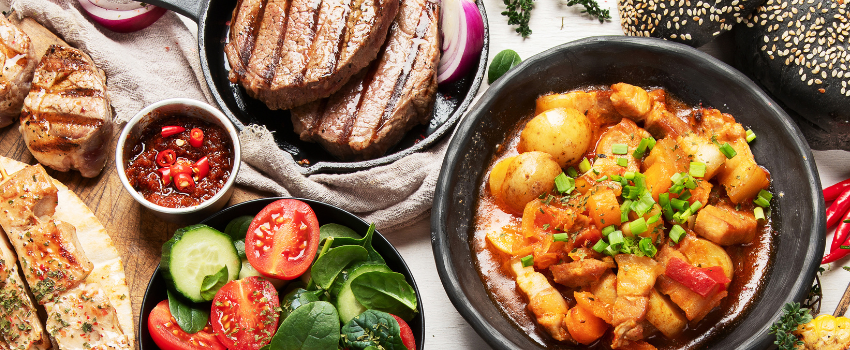
Should I avoid red meat and processed meat?
Red meat includes all fresh, minced, or frozen beef, pork, and lamb. Processed meat includes meat that has been processed using salting, curing or fermenting. Examples include bacon, ham, salami and sausages such as chorizo or hotdogs.
The World Cancer Research Fund (WCRF), has classified processed meat as Group 1 carcinogens (12). This means that there is a definite link between cancer and processed meat. Specific preservatives called nitrates and nitrites are added to processed meat to increase the shelf life. These preservatives have the ability to cause damage to cells in our body which may lead to cancer (13-16).
Red meat has been deemed as a Group 2A carcinogen (12). This means that it is a ‘probable’ cause of colorectal cancer but the evidence is not as strong. The risk of cancer is due to the red pigment called haem that is naturally found in red and processed meat. When haem is cooked at high temperatures (grilling, baking in the oven), it has the potential to produce carcinogenic compounds.
Should I follow a meat free diet?
Some large population studies have shown that people who follow a vegetarian diet are at a lower risk of certain cancers (15). However, we are unsure whether this is due to the lack of meat in their diet or related to other factors in their lives such as being health conscious, eating more plant-based foods, not smoking, or drinking less alcohol.
It is safe to follow a vegetarian or vegan diet if you have been diagnosed with cancer but there is no evidence that these types of diets provide any significant advantage (17). Following a vegetarian or vegan diet can make it harder to meet your nutritional requirements for some food groups especially protein. Vegetarian and vegan diets can also be low in certain nutrients such as vitamin B12, calcium, iron, vitamin D, iodine and zinc and you may need a supplement.
If you have been diagnosed with cancer and are following a vegetarian or vegan diet, ask your oncology team to refer you to a dietitian who can make recommendations to optimise your diet.
Red meat is very nourishing and is an excellent source of protein, iron, zinc and vitamin B12, when consumed in modest amounts. Small amounts of red meat can be consumed as part of a healthy, balanced diet, although consuming red meat is not necessary to maintain adequate nutritional status (12). Fresh white meat such as chicken, turkey or fish are not linked with cancer.
How much is too much?
The WCRF recommends that red meat intake should be limited to less than 500g cooked meat (or 750g raw meat). This equates to roughly 2 to 3 portions per week (12). A portion can be measured as roughly half the size of the palm of your hand.
Processed meat is generally high in calories (energy), fat and salt and there are currently no recommendations for safe intake. High intakes of processed meat could also cause weight gain which we know can increase cancer risk. It is recommended that processed meat is avoided. Processed meat is also high in salt which could contribute to cardiovascular disease (15).
How can we cut back on red and processed meats?
There are lots of ways to cut back on red and processed meats without feeling like you’re missing out.
- Bulk up with beans. Use kidney beans, chickpeas or lentils to replace some of the meat in dishes (e.g. Bolognese). These are good sources of protein.
- Eat smaller portions of red meat and include meat free days during the week.
- Choose fish instead.
Soya
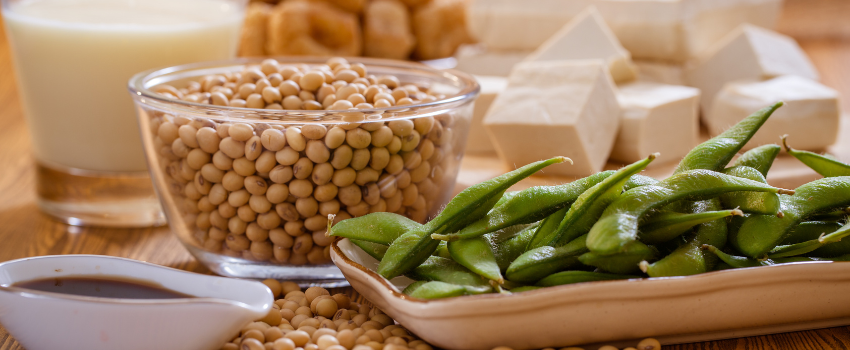
Does soya cause cancer?
No, there is no link between consuming soya and increased cancer risk. Soya is a protein naturally found in soyabeans and edamame. You can also find soya in tofu, soya milk, soya yoghurts and tempeh.
Products made from soya contain compounds called phytoestrogens. Phytoestrogens have a similar chemical structure to the hormone oestrogen which is made naturally in our bodies. Oestrogen has the ability to stimulate some cancers and it was previously thought that foods containing phytoestrogens might have the same effect (18,19). Women in particular with breast cancer were previously advised to avoid soya containing foods.
However, no human studies have shown a link between eating soya or soya products and an increased risk of cancer. There is now more evidence to show that an increased intake of soya-containing foods is safe to consume and can even reduce the risk of certain cancers (20), including breast cancer (21,22). This may be due to the high fibre content which is known to be beneficial in reducing bowel cancer risk (20).
We know that red and processed meat have been linked to an increased risk of cancer. Soya products can be used as part of a healthy balanced diet as a non-meat source of protein.
There is no evidence to support the use of soya dietary supplements and these are not recommended (23).
Organic foods
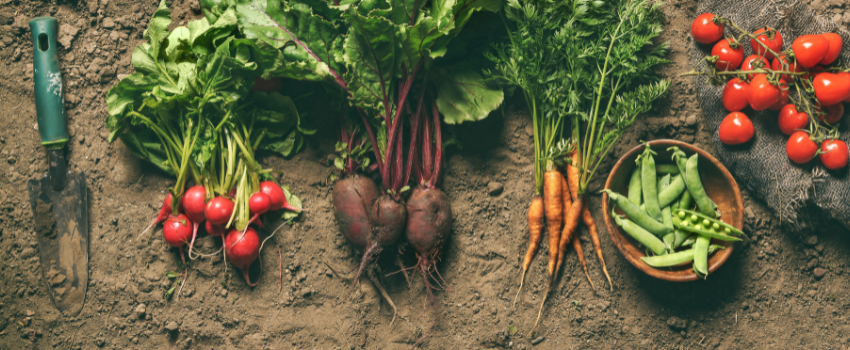
Will eating organic food reduce my cancer risk?
No, there is no strong evidence that shows that organic food reduces the risk of developing cancer. Organic food refers to food grown without using artificial fertilisers, pesticides or chemicals. This usually refers to dairy products, fruit and vegetables.
Organic food tends to be more expensive and has become increasingly popular due to claims that it is ‘safer and more nutritious’. However, the nutritional value of food is not altered when grown organically, so the nutritional composition of organic food versus non-organic food is the same (24-26).
In Europe, there are tight regulations set around the use of pesticides in food. Food Safety Authorities have a responsibility to ensure that the levels found in our food are within safe limits.
Studies have reported a link between organic food and reduced cancer risk but this is more likely because people who report eating organic food are more likely to engage in healthy lifestyle behaviours, such as not smoking and exercising regularly, which would reduce their cancer risk. It was also suggested that people who eat organic fruit and vegetables are more likely to have a healthier diet overall which also reduces cancer risk (27).
We do know that a diet rich in fruits and vegetables is a key part of cancer prevention (28), so the main priority is to include them as much as you can – organic, non-organic, fresh, frozen and tinned all count!
Superfoods
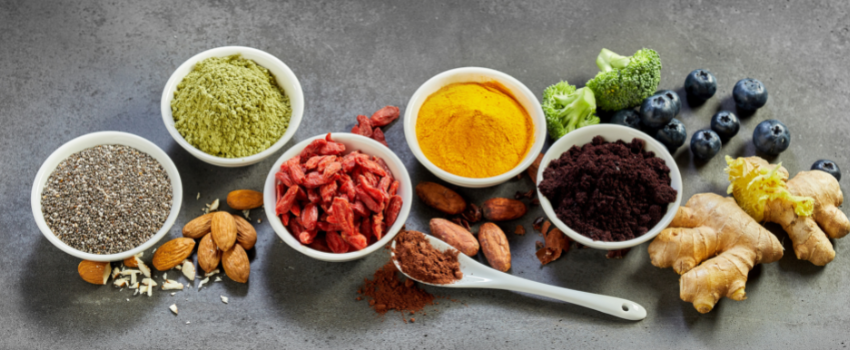
Can Superfoods help protect me from cancer?
No, there is no single food or nutrient that can prevent or cure cancer (29). Superfoods are foods that are marketed as having nutritional benefits that enhance health and protect against diseases such as cancer. You might have heard of kale, spinach or blueberries being referred to as superfoods.
Claims surrounding superfoods are often very misleading as they are usually based on results of studies looking at the effect of nutrients on cells in the lab. Although these studies give us important results, the findings cannot be automatically translated to human diets for a number of reasons.
Firstly, we don’t eat individual nutrients, we eat whole foods (29). A nutrient in isolation may cause a different response than if consumed within a whole food. Secondly, the nutrients being investigated are often studied at very high levels, levels much higher than what we would be able to eat in our diet.
Finally, our bodies also don’t act the same way cells do in laboratory studies. The relationships seen at cellular level might not exist at a whole-body level. So we need large scale population studies before we can make recommendations on individual nutrients.
In reality, there is no such thing as a superfood. No single food has the ability to ‘undo’ the effect of an unhealthy diet or lifestyle. Foods that have demonstrated beneficial properties are best incorporated as part of a healthy diet, along with a wide variety of other healthy foods.
There is also no evidence that taking shots of turmeric, wheatgrass, ginger or any other type of herbs or spices can protect against cancer. It has also been suggested that high doses of turmeric may interact with some chemotherapy drugs and make them less effective (31). If you are taking any spices or any herbal remedies please inform your oncology team.
It is also important to know that buying supplements or herbal products online might put you at risk of unwanted side-effects. Herbal products and supplements sold in food shops and in pharmacies have to comply with quality standards set out by the Food Safety Authority of Ireland. Products bought online may not have undergone such rigorous testing and may be potentially dangerous. Some products have been found to contain illegal substances and toxic herbs. The amount of the active ingredient can also vary widely between products.
No reputable cancer organisation supports the use of herbal remedies and if you are considering trying herbal medicine you should discuss it with your oncology team (31). Our overall dietary pattern is where we see the strongest link to reduced cancer risk. The World Cancer Research Fund recommend that a diet rich in wholegrains, fruit and vegetables and pulses, with lean meat, fish and low-fat dairy should be the focus for cancer prevention (31).
Dairy
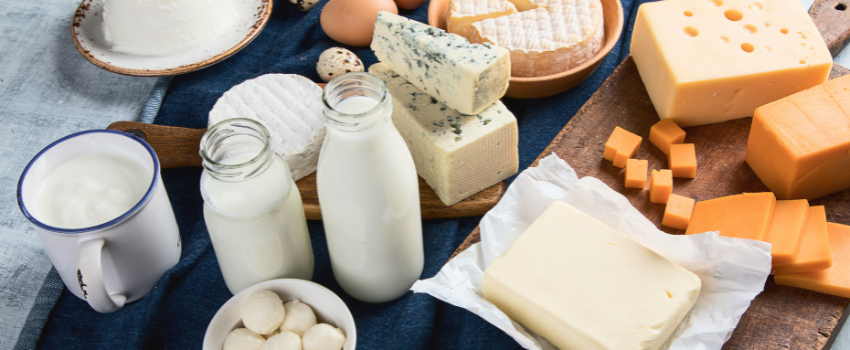
Can Dairy Products cause cancer?
No, there is no strong evidence that links dairy products to an increased risk of cancer (32). The myth that dairy is linked to cancer often comes from concerns the public have surrounding the addition of hormones to milk and meat products. In Europe, the addition of hormones to milk or meat is strictly banned and the sale of meat from countries where the addition of hormones is allowed is also illegal. So there is no need to worry about this.
What are the benefits of dairy products?
Dairy products are high in protein and calcium which are important for strong bones and teeth. There is also evidence to suggest that the high calcium content of dairy products contributes to a reduced risk of bowel cancer (33). The Department of Health recommends 3 portions of dairy a day.
1 portion is equal to:
– a 200ml glass of milk,
– or a matchbox size portion of cheese
– or a 125g pot of yogurt.
For those who don’t consume dairy, choose fortified alternatives (33). If you are buying plant-based milks try to ensure it has calcium and vitamin D added to it to help your bones stay strong. For cancer prevention, choose low-fat dairy products. This will help with weight management.
If you are undergoing cancer treatment and experiencing a reduced appetite or weight loss, you might be advised to increase your intake of full-fat dairy products.
Sugar
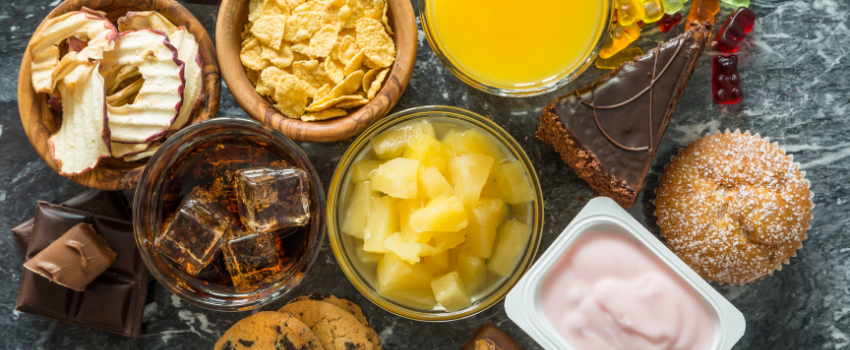
Do I need to avoid sugar in my diet?
No. Many people ask questions about sugar intake and its effect on cancer. Cancer cells use sugar (glucose) for energy but so do all the other healthy cells in the body. Some people have suggested that reducing sugar intake can slow cancer cell growth. Unfortunately it is not that simple. Restricting the amount of sugar you eat has not been proven to slow down or control the growth of cancer cells in humans (34). Laboratory studies have shown that the metabolism of glucose occurs more rapidly in cancer cells than in normal cells. This is often misinterpreted as sugar directly feeds cancer cells (34).
Sugar does not need to be totally avoided and can be included as part of a balanced diet. When digested in our body, glucose (sugar) is also found in several healthy foods such as fruits, vegetables, and wholegrains such as bread and porridge. These foods are high in fibre, full of minerals and vitamins, and have been linked to a lower risk of cancer. For more information see the section below on Ketogenic diets.
However, there is an indirect link between sugar and cancer. Eating a lot of foods with added sugar such as fizzy drinks, chocolate, biscuits, and cake, can increase your risk of being overweight or obese and are not recommended by the Department of Health (35). Being overweight or obese has been linked to an increased risk of cancer (36,37).
If you have been diagnosed with cancer and are losing weight you may need to consume some foods containing sugar to help reduce weight loss and to help keep your energy levels up. Speak to a dietitian or healthcare professional if you have any concerns. It is also important to note that there is no need to avoid any fruit because of its sugar content. Fruit is full of fibre, vitamins and minerals which are very beneficial for your health.
Should I avoid artificial sweeteners?
No, large studies have shown there is no link between artificial sweeteners and increased risk of cancer1. Artificial sweeteners are substances used to sweeten food but contain few or no calories (energy). They are usually derived from herbs and other plants, or from sugar itself and are typically many times sweeter than sugar. This means smaller quantities can be used (39). Examples include aspartame, saccharin, xylitol and mannitol.
Artificial sweeteners can be found in diet fizzy drinks, toothpaste, mints, and chewing gum. Often these products are advertised as ‘low sugar’, ‘diet’ or ‘zero’. All sweeteners used in Ireland undergo strict testing by the European Food Safety Authority (EFSA) and have been deemed safe to use on a daily basis and in a moderate amount (40). Early studies reported that saccharin caused bladder cancer in laboratory animals (mice) but human studies have reported no increased cancer risk (38).
Gluten
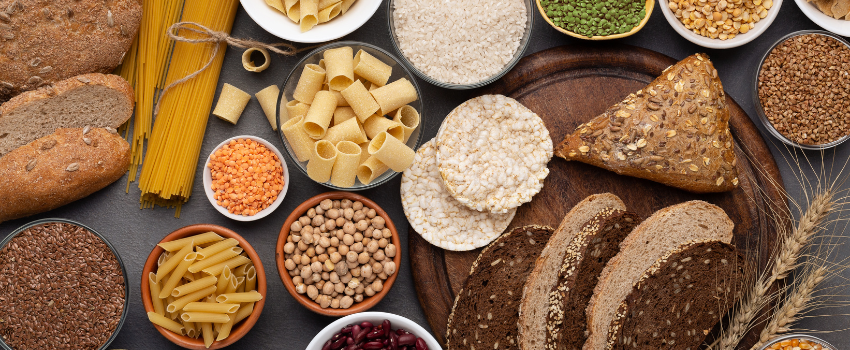
Should I avoid gluten?
No, there is no evidence that following a gluten free diet has any considerable health benefit for the general population (45).
Gluten is a protein found in wheat, rye and barley that causes no harm to the majority of people. People who have been diagnosed with coeliac disease are advised to follow a gluten-free diet by their doctor or dietitian to prevent other adverse effects.
Some individuals experience gluten-sensitivity without having been diagnosed with coeliac disease. For these individuals, gluten may contribute to inflammation in the gut and cause unwanted gastrointestinal symptoms such as bloating or changes in bowel movements (45). However, there is no evidence that consuming gluten increases the risk of GI cancers in the general population (46).
It is not advised to avoid foods containing gluten as these foods can be a good source of fibre and often contain vitamins and minerals that may be cancer protective (47). Foods that are high in fibre have been linked to a reduced risk of bowel cancer (47,46).
Other alternative treatment centres
You may have heard of some alternative treatment centres in countries outside of Ireland.
The most common centres are in Mexico, Germany, Hungary and Spain. These centres and the treatments they provide are not endorsed by any major international health organisation, for example the US Food and Drug Administration or The World Cancer Research Fund. The majority of treatments provided at these centres have no evidence to support the claims that they treat cancer and many of these centres encourage their patients to stop their conventional treatments such as chemotherapy or radiotherapy.
Delaying or stopping the anti-cancer treatments recommended by your oncology team may have a negative impact on your overall health. These centres do not give conventional medical treatment and rely on vitamin infusions, coffee enemas, unregulated ‘medications’ (banned in several countries including Ireland), urine vaccines, light therapy, heat therapy, oxygen therapy, multiple food restrictions and other unproven ‘therapies’.
Depending on your cancer stage and current symptoms, you may also put yourself at risk if you choose to fly to one of these treatment centres. These centres are extremely expensive to attend and can cost tens of thousands of euro depending on your length of stay. These centres often encourage patients to take out a mortgage or loan or use crowd-funding to finance the cost of attending these centres. This can cause unnecessary financial stress for you and your family.
If you are considering attending an alternative treatment centre, please discuss it with your oncology team.







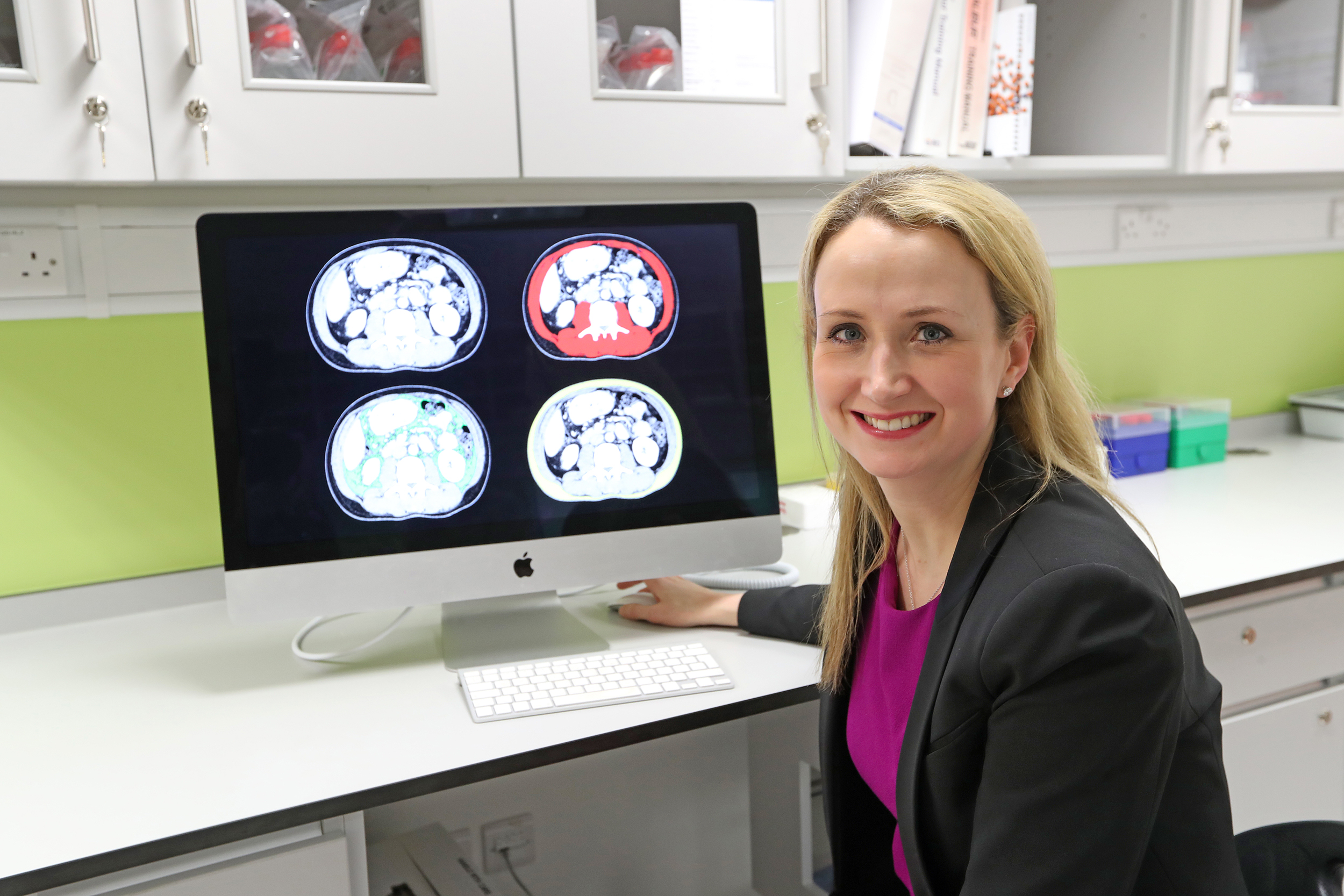


 Contact
Contact